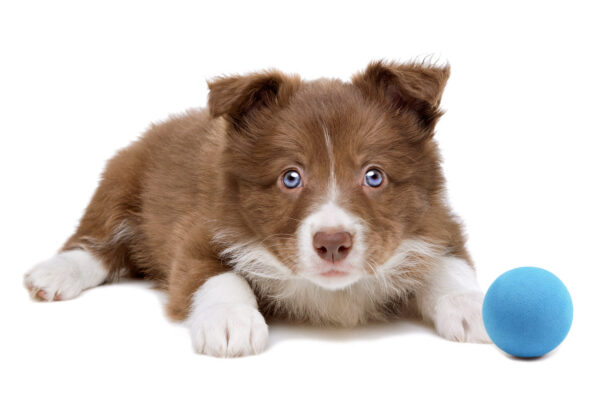Puppy Care
Welcoming your puppy into your home is a special occasion. Here are some tips for raising your new best friend.

A well cared for pup will grow to be a faithful companion for many years. Having a dog as a part of your family is a big responsibility as it will be totally dependent on you for shelter, food, education and good health.
Shelter
Your puppy needs a place of its own. Provide a clean box, bed or basket in a warm, draft-free area. Soft, washable bedding will help make your pup cosy.
Feeding
Initially feed the pup what it is used to being fed. Gradually change to the diet you want it on. A high quality puppy food such as Delicate Care, Australian University developed and Ziwi Peak will ensure that all your pup’s nutrient requirements are met. Remember that meat only is an inadequate and unbalanced diet for a dog of any age.
Under 12 weeks feed three or four meals a day. After 6 months, one or two meals a day are best.
Ensure access to fresh water at all times. Milk (Pet’s Own, Pet Plus) can be offered to young pups.
We design a nutrition plan together with you; taking into consideration breed, age, nutritional requirements, life style and budget.
Vaccination
A complete vaccination programme at 6, 12 and 16 weeks (or as advised for your pup) is vital to ensure protection against the potentially fatal diseases Distemper, Hepatitis, Parvoviral Enteritis, Leptospirosis and the highly contagious disease Kennel Cough. Your dog will need booster vaccinations every year, at the time of its annual health check.
To minimize vaccination protocols we also offer titer testing.
Worming
Puppies are commonly infected with worms and heavy burdens can cause severe problems. Worm your pup at 2, 4 and 8 weeks, then every month until 6 months of age and every 3 months thereafter. Use the correct dose for the dog’s weight. We are happy to weigh your pup for you and administer the tablets if you buy them from us. We recommend an Allwormer, which will eliminate roundworm, hookworm, whipworm and tapeworm, and we can supply this for you to use at home.
Remember roundworm and hookworm can be transmitted to humans, especially children, resulting in severe illness.
Heartworm
Heartworm larvae are transmitted from dog to dog by mosquitoes. The adults, once established, cause severe heart and lung problems which are often fatal. Prevention is preferrable to treatment. Preventative medication should be started at 16 weeks of age and should be continued regularly for the rest of the dog’s life. Discuss with us the best approach for your puppy.
Teething
The puppy’s permanent (adult) teeth will start to erupt from 3 months of age. The process takes up to 4 months and may cause sensitivity in the mouth and sometimes reluctance to eat. Occasionally the temporary (baby) teeth are retained. If this happens we advise that they be removed under a general anaesthetic, preferably at the time of desexing. Provide your pup with things to chew on, such as Greenies, rawhide chews, nylabones, pig’s ears and raw bones (NOT shoes, sticks and stones!!!)
Toilet Training
Toilet training should begin as soon as the pup comes to its new home, but, as with all training, be patient. Decide on a toilet area; either paper on the floor or an area outside, and take the pup there half an hour after eating, immediately it wakes up or if it looks as if it wants to go to the toilet. Praise the pup when it does the right thing. If an accident occurs, reprimanding will confuse the pup unless it is caught in the act.
Puppy Pre-school/Obedience Training
Begin teaching your pup simple commands like “sit”, and “come”. Call it by its name. Get it used to wearing a collar and walking on a lead. Be consistent and patient. Reward your pup with praise and occasionally with food (Vets Best Rewards). Join a Puppy Pre-school class and, as soon as your pup is fully vaccinated, join a local dog obedience club.
Exercise and Play
Dogs need regular exercise and play to prevent boredom. Ensure you take your dog for a walk at least once daily and set aside time to play with your dog. Provide a variety of toys.
Socialisation
As soon as your pup is used to your family and any other family pets introduce it to neighbours and friends and their pets (as long as they are healthy AND fully vaccinated). This interaction helps ensure that your pup is well adjusted and not frightened of other people and animals. As soon as possible join a Puppy Preschool class (see above).
Desexing
Desexing is recommended for every dog not intended for breeding: to prevent unwanted puppies and to help prevent roaming and aggression in males. Neutered animals will avoid problems such as difficult births, infections of the uterus, cancers of the ovaries and mammary glands and of the testicles and prostate gland. However, desexing too early can have a negative effect on joint health. We assess each puppy individually and advise accordingly.
Grooming and Ear Care
Get your puppy accustomed to being brushed all over. Keep hair trimmed well away from the eyes, and wipe away any tears. Check your puppy’s ears regularly and clean if necessary. Trim nails before they become overgrown. We can show you how to do this first time or do it for you.
Fleas and Ticks
The important thing to remember about the flea is that most of its life cycle is spent off the dog hence you may not see fleas on your dog but will still need to treat for them. Ticks have become more common and deadly in the city. Treat all dogs and cats in the household, every month of the year. We will tailor a treatment plan with the least toxic but most effective product for your pet.
Warning: There are multiple products in Australia freely available, which are due to their high toxicity under investigation in Europe. We always recommend the least toxic but effective treatment for your puppy.
Microchip & Registration
To allow you and your dog to be re-united if it strays, all dogs should be micro chipped before you get them ( if not, have this done immediately) and must be registered by six months of age. An identification tag should also be attached to your dog’s collar.
